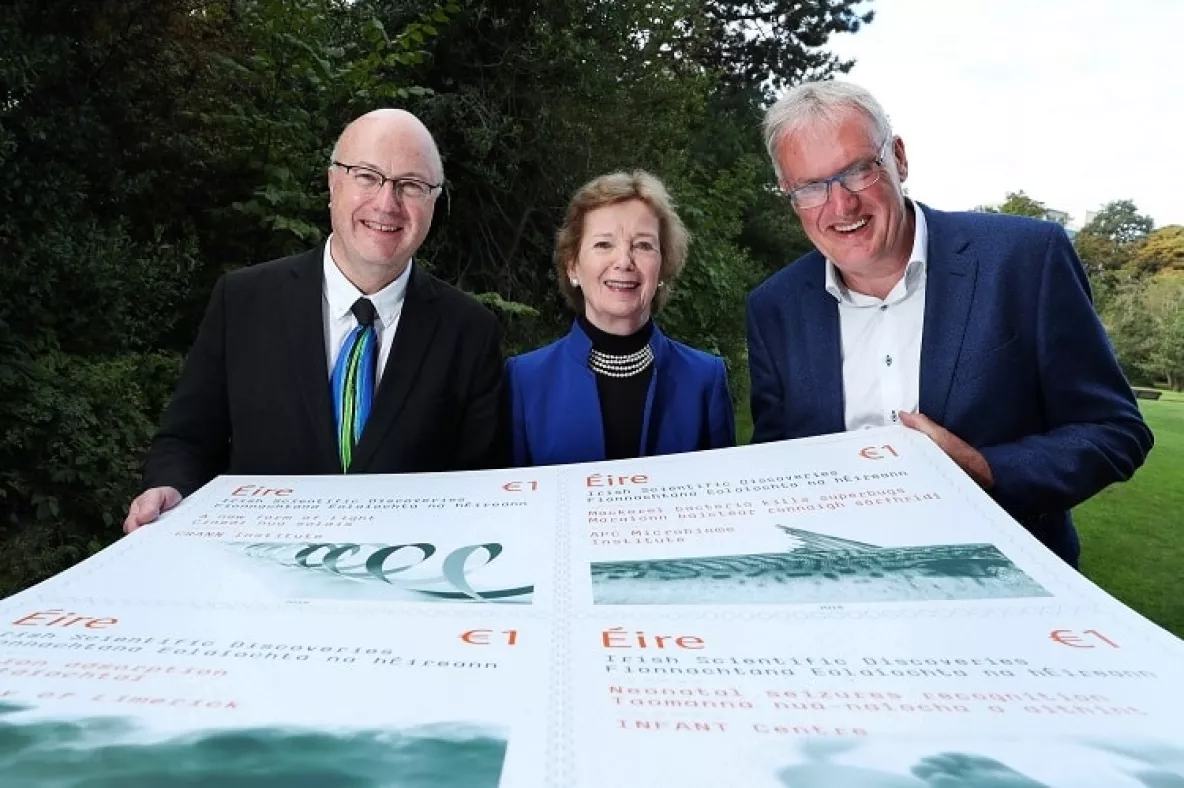
A discovery made at University of Limerick features on one of An Post’s four newly-unveiled €1 stamps. Titled Irish Scientific Discoveries, the stamps highlight recent scientific discoveries made by scientists who work in pioneering research and development in Ireland and UL is the only university named on the stamps.
The science-based stamps represent novel areas of research, which are generating new knowledge, cutting-edge technology and competitive enterprise. The four topics: new forms of light; fighting superbugs; emissions adsorption; and, predicting neonatal seizures, are examples of innovative and impactful academic research being carried out in institutions around the country.
Created by An Post in partnership with Science Foundation Ireland (SFI), the Irish Scientific Discovery stamps feed into Ireland’s rich scientific history, recognising its growing reputation for scientific excellence worldwide. This standing is demonstrated by Ireland’s ascent in global ranking of scientific citations – now the 10th most innovative country in the world (Global Innovation Index) and 11th for overall IMD World Competitive Ranking, 2017. A 2016 report into Opportunities and Challenges for European Tech Employers also showed 29% of Ireland’s population are now employed in science and technology.
The ‘Emissions Adsorption’ stamp is inspired by the work of Professor Mike Zaworotko, Director of Synthesis and Solid State Pharmaceutical Centre (SSPC), a global hub of pharmaceutical process innovation and advanced manufacturing, funded by SFI and based at UL. Professor Zaworotko is also Bernal Chair of Crystal Engineering at the Bernal Institute, UL. His work in the area of crystal engineering involves the design of new materials by treating molecules like LEGO® blocks so that they can perform an exact function based on a specific need including the adsorption of harmful gases.
SFI – an agency of the Department of Business, Enterprise and Innovation – is the national foundation for investment in scientific and engineering research and contributes to societal and economic awareness of the value of science, technology, engineering and maths to our economy and society. Science Foundation Ireland were involved in the selection of scientific breakthroughs which feature on the stamps.
Speaking at the launch of the stamps, Professor Mark Ferguson, Director General of Science Foundation Ireland and Chief Scientific Adviser to the Government of Ireland, said: “I am delighted to launch the stamp series dedicated to science in Ireland with An Post today. The release of the stamps comes at a fitting time, coinciding with the prestigious Schrodinger at 75 conference which welcomes Nobel Laureates and top researchers from around the world to Dublin. It is great to see our scientific achievements as a country being celebrated, as it is important to acknowledge our impact to date and to inspire our future work. This collection aims to showcase the excellent science and technology research ongoing across the country and encourages people to engage with it. The selected case studies represent just one small facet of the superb and wide-ranging contributions that Irish scientists are making to international advancements in STEM”.
“The scientific discoveries featured on the stamps are a credit to the institutions from which this new and exciting work is coming, they recognise the teams and individuals who are applying their minds and their experience to new discoveries and they show the importance of scientific investment and research in shaping the future,” he continued.
The stamps are available in the GPO, Dublin, at selected post offices nationwide or online at www.irishstamps.ie.
The other stamps feature research into new forms of light by Trinity College Dublin (TCD) researchers at the CRANN Institute, research in the area of fighting superbugs from researchers at the APC Microbiome Institute (an SFI Research Centre based in University College Cork) and Moorepark Teagasc Food Research, and research into neonatal seizures at the INFANT SFI Research Centre, UCC.